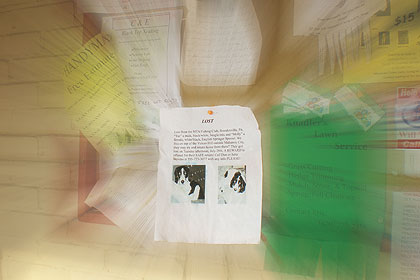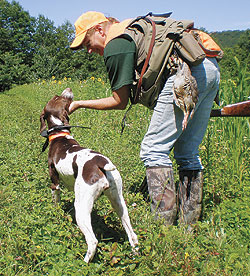Losing man's best friend is man's worst nightmare.
By Lisa Price
I found a family's lost dog once, and she'd been dead a long time. The brown hair was sunken between the ribs and the teeth seemed huge, out of proportion in the skeletal jaw. I'd been scouting for the upcoming Pennsylvania bear season, looking for tracks or scat in a marshy area, and came across the remains.
I left the woods carrying the dog's collar, knowing I'd soon refresh an old wound. The collar still held the dog's license from Dade County, which is in Florida. I tracked down the dog's owner through the county treasurer's office and called the owner's phone number repeatedly, but kept getting a recording.
It broke my heart, that recording. The kids introduced themselves, and then took turns from the script, "We're not home! You know what to do!" Finally I got the husband; they'd had an accident on the interstate in that area about two years prior, and their Lab had disappeared from the scene. They'd always wondered what happened to her.
I lied and said she'd died just a short distance from the highway, and I mailed the collar as promised.
The story of a loved dog's life almost never has a happy ending. They get cancer, they get hit by cars. They get poisoned, they bloat, they get complications from Lyme disease or they get so old that their systems fail and our veterinarians put them to sleep. When those things happen, we beat ourselves up about it; all the things we should have done while they were in our care.
But if you really want to beat yourself up about losing a dog, actually lose one. Fewer than 20 percent of lost dogs are returned to their owners.
Licensing and ID Tags
Licensing your dog within your home county is a legal requirement, but it may not help you find your dog if you lose it out of the area. For example, how many people would know that my home county, Schuylkill, is in Pennsylvania? In the case of finding the dog's skeleton, I'd been to Miami and knew where Dade County was.
 Fewer than 20 percent of lost dogs are returned to their owners. |
Records of dog owners and licenses are usually kept with a county treasurer's office, open from 8:30 to 4, Monday through Friday. If you lose your dog on a weekend while you're hunting out of state, the person or animal shelter who finds it will have to wait until Monday to get your contact information. And if they're calling your home number, you won't be there to take the call.
When you license your dog, make sure you include a phone number that is either connected to an answering machine you can check from out of state, or the number of a cell phone that you'll be carrying.
Those same phone numbers should be written directly on the dog's collar, and on the ID tags. Also, if you'll be hunting at a lodge or staying with friends, you could include that number on a temporary tag. Cover all your bases, since cell phone coverage can be spotty on the remote grasslands where we often hunt.
Microchipping
Six-year-old Natalie Villacis of Queens, New York, came home from school one day to find that her beloved beagle, Rocco, had dug under a fence and escaped from their yard.
Her family scoured the neighborhood for him for weeks with no luck.
Five years later, Natalie's astonished mother fielded a call from an animal shelter worker in Hinesville, Georgia. Were they missing a beagle named Rocco? Natalie and Rocco were soon reunited.
 Garmin's Astro is easy to use and will help prevent your gun dog from going astray. |
Microchips used to be a crap shoot. There were several brands, and each worked with a specific scanner. The scanners were expensive, and animal shelters usually could afford just one. If they didn't have the scanner that matched the chip, it couldn't retrieve the information.
Now there are several "universal" scanners which read all types of microchips. Having the chip put into your dog, a simple injection under the dog's skin, only costs from $20 to $30 at most veterinary offices. It may be the cheapest, best and most permanent way of making sure your dog can be identified.
Through the microchip, information about the dog, including the owner's contact information, is available in a nationwide database accessible via a toll-free number 24/7.
You can also notify the microchip company should you lose the dog.
Mary Metzner, who oversees shelter operations service and support for microchip industry leader AVID (Animal Veterinary Identification Devices), said that since the company launched the product in 1991, it has provided chip "readers" to animal shelters at no cost. The chip is linked to the owner through a network called PETtrac.
"When the dog owner sets up the account, they provide a primary and alternate phone number," she explained.
"That way if you're traveling and away from your primary residence and the dog gets lost, you can check in using the alternate phone number.
"For the alternate number you want to pick a number that will be available every day," she added. "Puppies can be chipped at the same time they get their first shots."
In the dog breeding world, for absolute validity, test results for OFA ex-rays should include a dog's microchip or tattoo number, verified by a veterinarian. If you're reading an OFA number, those which include a microchip or tattoo validation end with the initials P.I. (Permanently Identified).
Worth a Thousand Words
Make sure you have up-to-date photographs or digital images of your dog, preferably from several angles. Take them with you when you travel. If the unthinkable happens and you lose your dog, you can include the picture on the informational fliers you plaster all around the area.
Animal Shelters, Rescue Groups
I was dropping off a couple bags of old blankets and t
owels at the local animal shelter when I spotted two purebred dogs romping in an exercise area. "Hey," I asked one of the shelter workers. "Where did you get the vizslas?"
With apologies to vizsla owners everywhere, I relay that the animal shelter had the two strays listed as redbone coonhounds. I've also had the same shelter call me about a stray German shorthaired pointer (they knew I was involved with rescue) that turned out to be an English pointer.
If you lose your dog, you should notify local law enforcement personnel, members of sporting dog clubs, farmers, veterinarians, school bus drivers; really, everybody who might see or hear about your dog. And of course notify every animal shelter, but also visit the shelters. Leave pictures with everybody.
Through the AKC website (www.akc.org), notify the rescue group for your breed which is closest to the area where you lost your dog. For example, from the AKC site, go to Breeds, and then click on your dog's breed. Along with information about the breed standard and temperament, on the left hand side of the page, under "Contact Us" you'll see "Breed Rescue." That will take you to the national breed rescue website; from there, click on the state abbreviation.
If you read the stories about the dogs available for adoption, you'll see that many arrived at rescue groups from animal shelters, or as strays rescued by volunteers, and are fostered in various homes.






